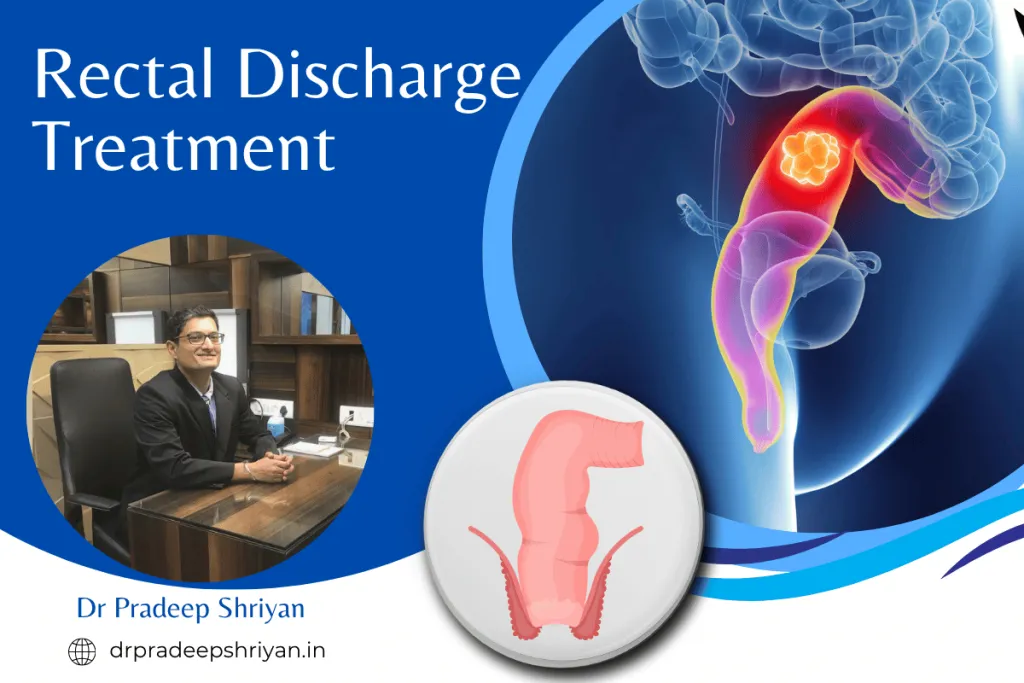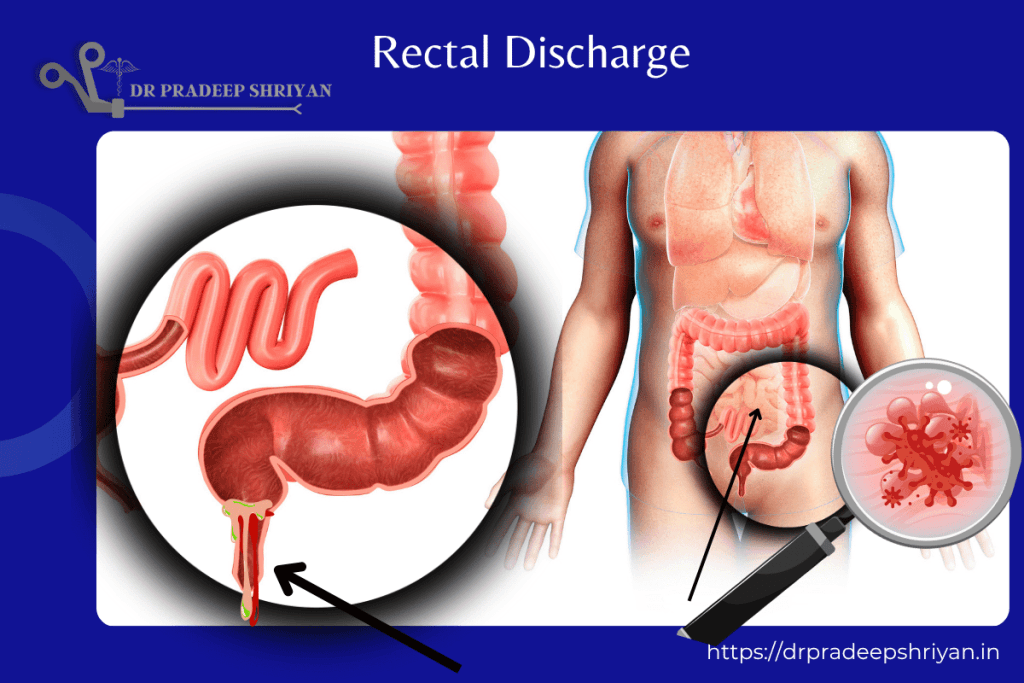Gallbladder disease affects thousands of people every year and is especially common in urban hubs like Mumbai. Timely detection and proper medical intervention can prevent serious complications and ensure a rapid recovery
Rectal discharge refers to any substance, such as mucus, pus, or blood, that comes out of the rectum aside from normal stool. Noticing rectal discharge can be alarming, but understanding its underlying causes and available treatments is crucial for your health and peace of mind. Senior surgeons, including experts in Mumbai – Dr Pradeep Shriyan, evaluate these symptoms for Rectal Discharge thoroughly to ensure optimal care and Treatment
October 10, 2025
Rectal discharge may have several causes, often linked to digestive health or infection. The most frequent include:
Hemorrhoids are swollen blood vessels in and around the rectum and anus. They may produce discharge if irritated, and this can be mucus or blood. Other related symptoms include itching, discomfort, pain, and sometimes swelling or lumps near the anus.
Small tears or cracks in the lining of the anus can cause pain, bleeding, and mucus discharge, especially during bowel movements. Fissures usually result from passing hard stool or chronic constipation.
Conditions like Crohn’s disease and ulcerative colitis cause chronic inflammation of the digestive tract. Patients may experience mucus or blood in stool, diarrhea, abdominal pain, and frequent urge to pass stool.
Rectal discharge may be a sign of infections. Bacterial, viral, or parasitic infections such as chlamydia, gonorrhea, herpes, or syphilis can all affect the anal and rectal area. These are often seen in people engaged in receptive anal intercourse, but may occur otherwise as well. Infectious discharge can appear alongside pain, itching, and sometimes ulcers.
In rectal prolapse, the rectal wall drops through the anus, leading to mucus-like or bloody discharge and discomfort. Older adults or those with chronic constipation are most at risk.
Proctitis is inflammation of the rectum, which may result from IBD, infections, radiation therapy, or surgery. Symptoms include persistent urge to defecate, pain, blood or mucus in stool, and sometimes diarrhea.
An abscess is a pus-filled cavity near the anus, which may burst and lead to purulent discharge. A fistula is an abnormal tract between the rectum and skin, resulting in chronic leakage of pus or fecal fluid.
IBS is a functional disorder that can cause mucus discharge, especially in those with diarrhea-predominant symptoms. It is typically associated with abdominal pain and changes in bowel habits.
Though less common, tumors or polyps in the rectum can cause bloody or mucous discharge, often with other warning signs like persistent pain, changes in bowel movements, or weight loss.

Rarely, poor anal hygiene, trauma, foreign bodies, or post-surgical changes may result in rectal discharge.
The most common infections and conditions causing rectal discharge in adults include:
A thorough medical evaluation helps identify the underlying cause:
Prompt diagnosis is crucial since some causes, like infections or cancer, require urgent attention.
Yes, treatment is required in most cases as rectal discharge may indicate a significant medical condition. Ignoring persistent symptoms can lead to worsening disease or complications.
Treatment Depends on the Cause
Mild cases respond to conservative management – warm water baths (sitz baths), dietary fiber, topical creams, and pain control. Severe or unresponsive hemorrhoids may require surgical procedures like banding, sclerotherapy, or hemorrhoidectomy.
Primary therapy includes stool softeners, high-fiber diet, local anesthetic ointments, and warm baths. Chronic or severe fissures may need surgical intervention.
IBD requires specialised medical management with anti-inflammatory drugs (aminosalicylates) immune modulators, and sometimes biologics. Surgical treatment is considered in severe or complicated cases.
Sexually transmitted or other bacterial infections are treated with appropriate antibiotics or antivirals. Sexual partners may also need evaluation, and safe sex practices are advised.
Surgical correction is the definitive treatment, especially in recurrent or severe cases. Proper supportive care is given before and after the operation.
Treatment is based on underlying cause – antibiotics for infection, anti-inflammatories for IBD, and supportive care.
Abscesses are treated with surgery to drain the pus, sometimes followed by antibiotics. Fistulas may require surgical repair to prevent recurrent discharge and infection.
Dietary and lifestyle changes, probiotics, and medicines that target bowel motility or pain are the mainstay. Psychological support may be useful in selected cases.
Polyps are usually removed endoscopically, while confirmed cancer requires a comprehensive treatment plan including surgery, chemotherapy, and/or radiation.

Consult a specialised surgeon if you have:
Timely evaluation ensures proper diagnosis and management, which can improve symptoms and prevent serious complications.
About Dr Pradeep Shriyan for Rectal Discharge Treatment in Mumbai:
Dr Pradeep Shriyan is among the most experienced general and laparoscopic surgeon in Mumbai, with over 23 years of surgical practice and is known for his patient-first approach and holistic care.
His reputation for gracious and specialised treatment makes him a preferred choice for patients seeking safe, successful Anorectal or Rectal Discharge Treatment in Mumbai.
If you have symptoms or worrying signs, consult Dr Pradeep Shriyan for a specialised evaluation and the best treatment options suited to your needs in Mumbai. Your comfort, safety, and recovery are always his priority.
Rectal discharge is a symptom with many potential causes, nearly all of which benefit from prompt medical evaluation and treatment. Senior surgeons in Mumbai, such as Dr Pradeep Shriyan, offer comprehensive diagnostic facilities and specialised management for patients experiencing these symptoms, helping restore health and comfort quickly.

Contact Us
Gallbladder disease affects thousands of people every year and is especially common in urban hubs like Mumbai. Timely detection and proper medical intervention can prevent serious complications and ensure a rapid recovery
Anal warts, fleshy growths that develop around the anus or in the lower rectum. These warts are caused by certain strains of the human papillomavirus (HPV), a common sexually transmitted infection
Tenesmus is a term used to describe a persistent and often painful sensation of incomplete bowel evacuation, or the feeling that you need to pass stools even after having a bowel movement.
Proctitis Treatment in Mumbai. Proctitis is an inflammation of the rectum, which is the last section of the large intestine before the anus.
Developed by PRAZONE Web Solutions
Copyright © 2024 All rights reserved by
Dr Pradeep Shriyan